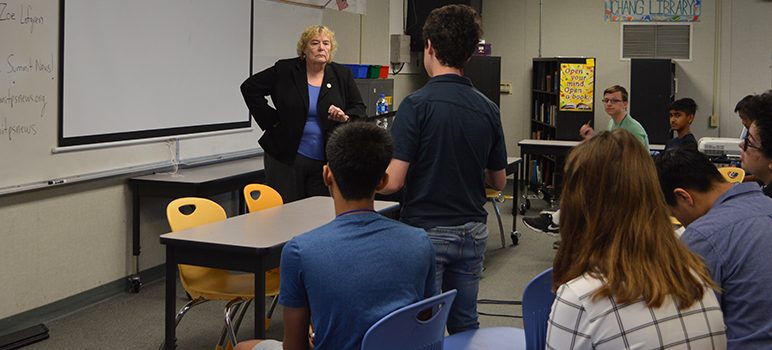U.S. Rep. Zoe Lofgren (D-San Jose), who represents California’s 19th Congressional District, believes young people hold the power in determining which direction the country is heading toward.
Lofgren visited Summit Public School: Tahoma on Sept. 21 for a press conference with high school journalism students. She touched on many issues important to her, such as immigration, waste disposal methods, gun violence, renewable sources of energy, healthcare and education. She also shared her opinions on specific events, such as FEMA’s administrative procedure after Hurricane Maria and the controversy over Supreme Court nominee Brett Kavanagh.
Lofgren grew up in the Bay Area as the daughter of a beer truck driver and a cafeteria cook. Her parents, although they had blue collar jobs and no college education, firmly believed “they were in charge of the government” as voters and citizens of the United States. The veteran stateswoman described how her family would discuss the political climate during dinner and how she would tag along with her mother for precinct walking when she was as young as 5 years old.
She shared about her uncertainty as a young adult, wondering if she even mattered in the world of politics. “I was brought up to assume that the direction of the government was my responsibility,” Lofgren explained. “I could have done other things … but I wanted to make change instead of money.”
Lofgren said she identifies as a wife, a mother, a grandmother, a woman and a Democrat, and she aims to improve the quality of life for California residents and families.
When asked what it means for her to be a U.S. Representative, Lofgren said it means “trying to make sure what I do is in the best interest of the people I represent,” which at times can be difficult because her district houses approximately 700,000 people.
One such example of Rep. Lofgren supporting the best interests of the people, as she recounted, was fighting the banks during the mortgage crisis in the economic downturn of 2008. The banks were treating the people “just appallingly bad,” so Lofgren’s team worked toward better funding sources for affordable housing. She witnessed the real-life effect of her labor when she visited another school and met a student who hugged her and, crying, thanked Lofgren for helping her family save their home.
“We want to stand up for people that are being trampled by big entities, governmental or profitable, and that’s a component of representing people as well,” she said.
The same attitude was reflected in Lofgren’s stance on healthcare and her opinion on the separation of families at the border.
In regards to healthcare, Lofgren referenced the Affordable Care Act for helping a lot of people by making healthcare more available and getting rid of discrimination based on pre-existing conditions and lifetime caps for insurance coverage. She acknowledged that it “was not a perfect bill” and that it missed the mark on understanding the high cost of living in areas like Santa Clara County, which makes it more difficult to get better coverage. She stated that “the country would be better off if we had a Medicare-like system for the entire population,” because “people who are in Medicare love Medicare, and it is a lot less expensive to administer than private insurance.”
When asked about the immigration policy of removing children from parents at the border, she described it as “wrong and immoral” and a “tremendous stain on the country.” She added that the immigration courts are not independent, which gives the Attorney General the ability to “re-decide” each case; as a result, she explained, this makes it more difficult because the current AG, Jeff Sessions, is anti-immigrant.
Despite the Senate and the House of Representatives both being led by a majority of Republicans, Lofgren pushes for changes to improve living conditions for the population. The Z’s to A’s Act sponsored by Lofgren would push back school start times to 9am, a problem she realized from her own kids struggling to get to school by as early as 7am.
Lofgren also advocates for improved waste disposal sustainability: “Waste needs to be seen not as a problem, but as an asset. If you start doing that, you start seeing waste in a different way.” She detailed a trip she took to the San José-Santa Clara Regional Wastewater Facility, a water recycling plant that takes in sewage and filters it into clean, drinkable water. She also mentioned the waste-to-energy plants in Europe, which take in trash and turn it into a source of energy (a possible solution to the United States’ inability to move waste to China, due to the country’s ban on plastic waste).
Lofgren stressed the importance of young people speaking out and standing up for what they believe in. “The voices of 18-year-olds count a lot,” she said. “If just 80 percent of people under 25 voted, our country would be headed in a much different direction.”
Ultimately, Lofgren said, she makes a point to use her position to advocate for people who lack opportunities to voice their opinions, and to propel California and the country in a positive direction.
C.M. Bateman is editor-in-chief of Tahoma student newspaper. Staff writers Jacob Kahn-Samuelson, Avi Mehra and Kaitlyn Kelley also contributed to this article. Opinions in this article are the authors’ own and do not necessarily reflect those of San Jose Inside. Send op-ed pitches to [email protected].

